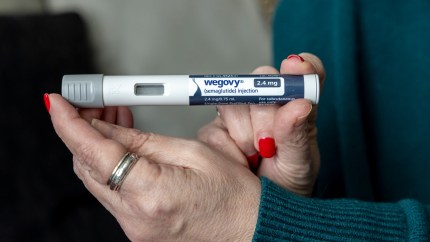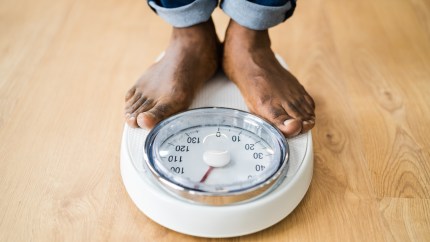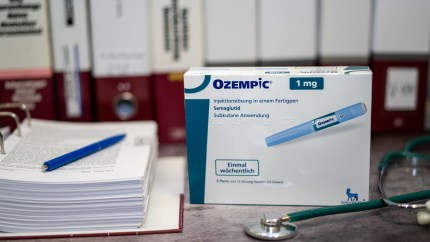Study finds many GLP-1 weight-loss patients discontinue treatment too soon
GLP-1 drugs such as Wegovy, Ozempic, and Zepbound are a class of medications primarily taken to treat Type 2 diabetes and, more recently, obesity.

Research indicates many people taking GLP-1s for weight loss fail to adhere to the regimen long enough to achieve the desired outcomes.
According to CNN, an analysis of health insurance claims released Tuesday found that most people using Wegovy and other GLP-1 medications — about 58% — discontinued their treatment within 12 weeks, falling short of a critical benchmark set by professional organizations to reassess the treatment’s clinical effectiveness.
Patients begin with a low dose of the medications and are supposed to gradually increase it over time until they reach a targeted dose. However, the analysis shows that over 30% of people dropped out after the first four weeks of treatment before reaching the targeted dose.
The study examined pharmacy and medical claims for approximately 170,000 individuals with Blue Cross Blue Shield insurance plans and prescribed GLP-1 drugs for weight management between 2014 and 2023.
“These are long-term medications to treat a chronic disease,” explained Dr. Disha Narang, director of obesity medicine at Chicago’s Endeavor Health, who was not involved in the new research. “This is absolutely a marathon, not a sprint. And when we do treat this as a sprint, I think patients are likely to get off of medication much faster.”
Experts suggest that one of the many reasons people might end treatment early is that they grow impatient with the results. As previously reported by theGrio, only about two-thirds of adults who have used injectable weight-loss drugs feel they were effective, according to a recent KFF poll.
Additionally, those who have stopped using the medications were significantly less optimistic about their benefits. Specifically, only about half of those who had used injectable weight-loss drugs in the past found them effective, compared with nearly three-quarters of those who were actively using the treatments.
Side effects such as nausea, vomiting, constipation, and diarrhea, which are common early on, may also deter people. Data from the longest clinical trial of Wegovy showed that 17% of people using the drug decided to stop participating in the trial because of side effects.
The cost of GLP-1 medications can also be a barrier, as a month’s supply can amount to about $1,000 or more. However, the analysis only included individuals with insurance plans that covered weight-loss medication prescriptions. While insurance plan copays may have influenced cost considerations, the analyzed individuals did not have to pay out-of-pocket for their treatment.
Findings from the Blue Cross Blue Shield data highlight the crucial role healthcare providers can play in helping patients adhere to their GLP-1 treatment.
Patients who had less frequent meetings with their healthcare providers, as well as those residing in underserved regions with significant health disparities, were more likely to discontinue GLP-1 treatment earlier. Dr. Razia Hashmi, vice president of clinical affairs for the Blue Cross Blue Shield Association, asserted that each additional follow-up visit increased a patient’s likelihood of staying on the treatment by 60%.
Recommended Stories
While most prescriptions came from primary care physicians, individuals prescribed GLP-1s by endocrinologists or others with expertise in weight management were more likely to reach at least 12 weeks of continuous treatment.
“Wraparound support services really make a difference — whether a person has lifestyle support management, nutrition, diet and side effect management,” said Hashmi, who added that “health equity matters. Social drivers of health — transportation, access to food, socioeconomic status — all of that also makes a difference.”
Another new report from Dandelion Health, a healthcare analytics firm that used the electronic health records of nearly 17,000 individuals prescribed a GLP-1 between 2019 and 2023, supports the theory that long-term treatment extends the benefits of the medications.
As one of the first reports offering real-world data on GLP-1 efficacy, initial findings revealed that individuals using the medications experienced an average weight loss of about 1.4% after three months, which gradually increased to an average of about 3% after a full year of treatment.
Compared to a group of individuals with similar clinical characteristics — closely matched in terms of demographic factors, treatment indicators such as average body mass index and diabetes prevalence, history of treatments, and prevalence of related comorbidities — the analysis revealed those taking GLP-1s lost nearly twice as much weight.
While experts caution that the treatment process may vary for each individual, GLP-1 treatments can still yield significant results.
“Whether it’s an employer trying to make a decision or an individual patient trying to make a decision, it’s really important to understand the success factors,” said Hashmi. “We want the investment to pay off.”







